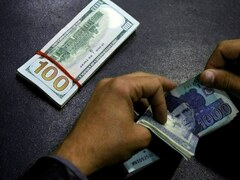ISLAMABAD: The Government of Pakistan and the International Finance Corporation (IFC) as a part of World Bank’s 10-year Country Partnership Framework Friday signed an agreement on accelerating the adoption of electric mobility in Pakistan by promoting investment in electric two-wheeler and three-wheeler vehicles (e-2/3Ws).
The agreement was signed here at the Ministry of Industries and Production by the Saif Anjum, Secretary Ministry of Industries and Production and Zeeshan Sheikh, IFC’s country manager for Pakistan and Afghanistan.
This advisory project will support policy, regulatory, and standards-related reforms to create an enabling environment for investment across the e2/3Ws value chain, helping to fill market gaps and remove legal and regulatory barriers.
EV sector: experts demand developing needed infrastructure
As part of the partnership, IFC will provide technical implementation support and work with key regulators including the Engineering Development Board (EDB), National Energy Efficiency and Conservation Authority (NEECA), and Pakistan Standards and Quality Control Authority (PSQCA) to build institutional capacity and streamline the development of the e-2/3Ws market in Pakistan.
The Special Assistant to the Prime Minister (SAPM) Haroon Akhtar Khan along with senior government officials, policymakers, industry experts, and development partners attended the ceremony.
“A conducive policy and regulatory framework will encourage local manufacturing and enable the uptake of electric two and three-wheeler vehicles,” said Haroon Akhtar Khan, Special Assistant to Prime Minister for Industries and Production Division. “Without improving this framework, it is highly unlikely that the national targets set for electric vehicle adoption will be met.”
EVs’ manufacturing licenses: two, three wheelers take front seat in Pakistan
He emphasised the need for concerted action to catalyse the adoption of electric vehicles in the country stressing that priority should be given to e-2/3Ws and electric buses, given their prevalence and socio-economic importance.
Key strategies moving forward include strengthening coordination and clarifying the policy environment, reducing capital costs through localisation and aggregated procurement–particularly for e-2/3Ws–and unlocking affordable commercial financing through risk sharing instruments.
“We are thrilled to enter into collaboration with IFC that will provide Pakistan with an important boost to expedite the transition toward electric two- and three-wheelers. With more than 23 million two and three wheelers on road, making transportation sustainable will require scaling up public and private investment in transportation methods and value chain which use little, or no fossil fuel and this project will help us in unlocking potential investment,” said Saif Anjum, Secretary Ministry of Industries and Production.
“Electric vehicles account for less than one percent of Pakistan’s transport fleet and IFC is committed to accelerating the shift to cleaner transport solutions that reduce reliance on imported fuels and improve urban air quality,” said Zeeshan Sheikh, IFC’s country manager for Pakistan and Afghanistan.
“This project supports Pakistan’s broader sustainability goals by promoting innovative, energy-efficient transport, in alignment with the World Bank Group’s 10-year Country Partnership Framework for Pakistan.”
This advisory project is part of a joint IFC-World Bank e-mobility initiative and will support the implementation of the National Electric Vehicle Policy (NEVP) 2019 by helping develop key regulatory and safety standards to boost e-2/3W manufacturing, aiming for 30 percent of vehicles to run on electricity by 2030.
The project is funded by the CIFPAK facility a climate-related blended finance programme which is managed by IFC, in partnership with the UK Foreign Commonwealth and Development Office.
Copyright Business Recorder, 2025























Comments